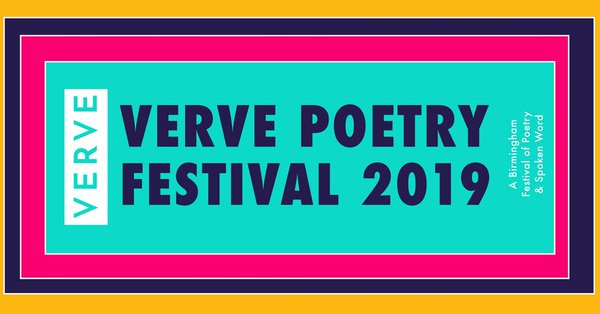
‘We’re the extended family of indie publishers, editors, poetry nights, producers and event organisers.’ – Cynthia Miller on what Verve is and why it is the single most ambitious and important thing she’s ever done.


Next Thursday the single most ambitious and important thing I’ve ever done kicks off. Verve Poetry Festival’s mission is to showcase the diversity, heart and dizzying talent of UK poets and change how you feel about poetry. It runs Feb 14-17 in Birmingham.
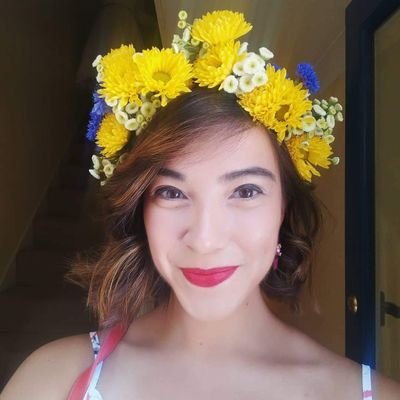
We have a ludicrous line up of 50+ poets who, I kid you not, are life=changing to hear and read. Poets like Vahni Capildeo, Roger Robinson, Bernadine Evaristo, Liz Berry, Polarbear, Inua Ellams, Momtaza Mehri, Andrew McMillan, Amy Key, Anthony Anaxagorou, Alison Brackenbury and many, many more!
Also, if you haven’t heard of those names, that’s *totally cool*. Actually, that’s IDEAL. I love that hundreds of poetry nerds enjoy Verve but what i love most is when people who aren’t writers attend / are dragged along and end up being astonished, moved, delighted.
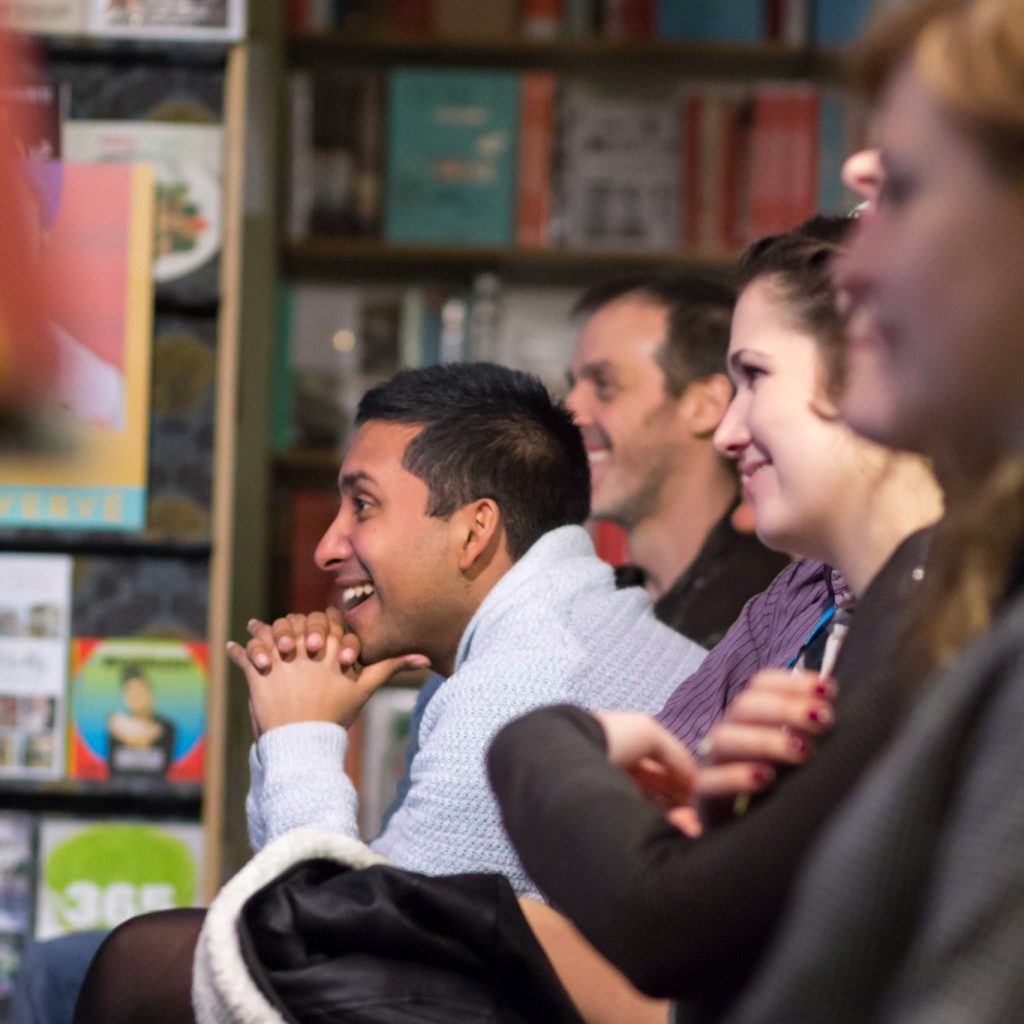
Here’s what I mean: this is one of my favourite Verve photos. It’s form 2017, our first festival. My friend showed up for moral support and was so blown away by Emily Harrison in the Burning Eye Books Showcase event. That joy is what poetry should do for everyone, not just poetry lovers.
Some poetry you’ll love. Some you won’t (which is fine too!). The whole point of Verve is that you get to experience different kinds of art without all of the pretention, eye-watering prices, London-centricity or homogenous line-ups that usually happens in the literature world.
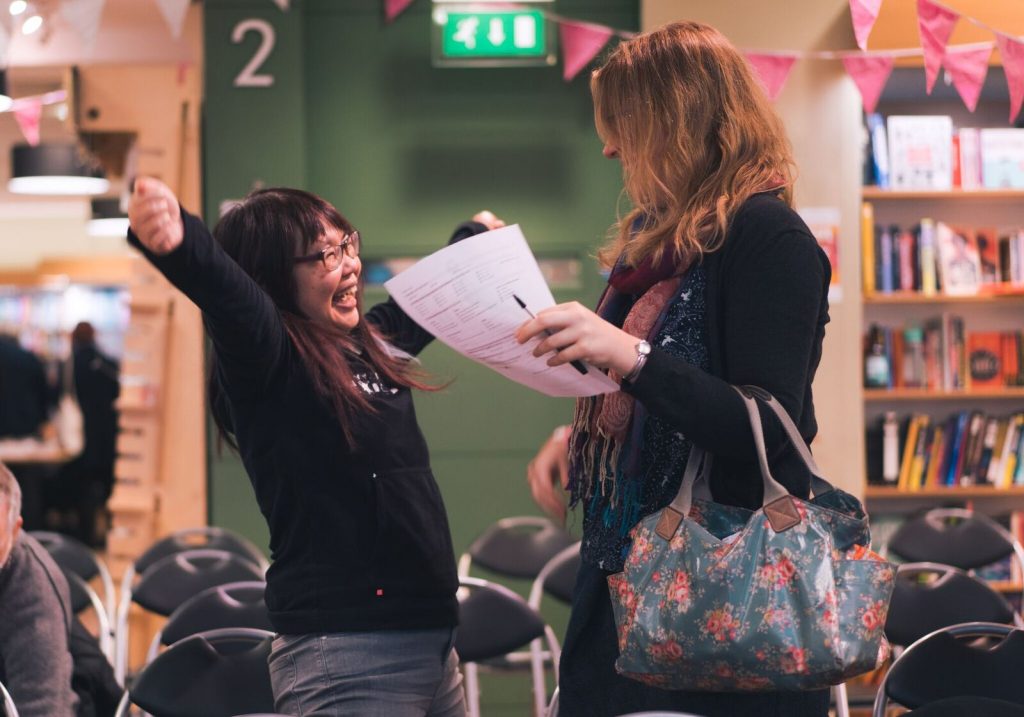
This year we’re experimenting with a bunch of new things. We’re launching an Annual Performance Lecture with poetry icon Anthony Anaxagorou, blending spoken word and academic discourse for an incisive, urgent, discussion of race and class in how page vs stage poetry is perceived.
We’re book-ending the fest with two music/poetry jams – Inua Ellams RAP Party on Thursday and The Funkenteleky Verve Special for Sunday’s finale, because everyone needs hip-hop and improv jazz in their life. We’re hosting our first ever Poet of the Festival, Sumita Chakraborty, all the way from the US!
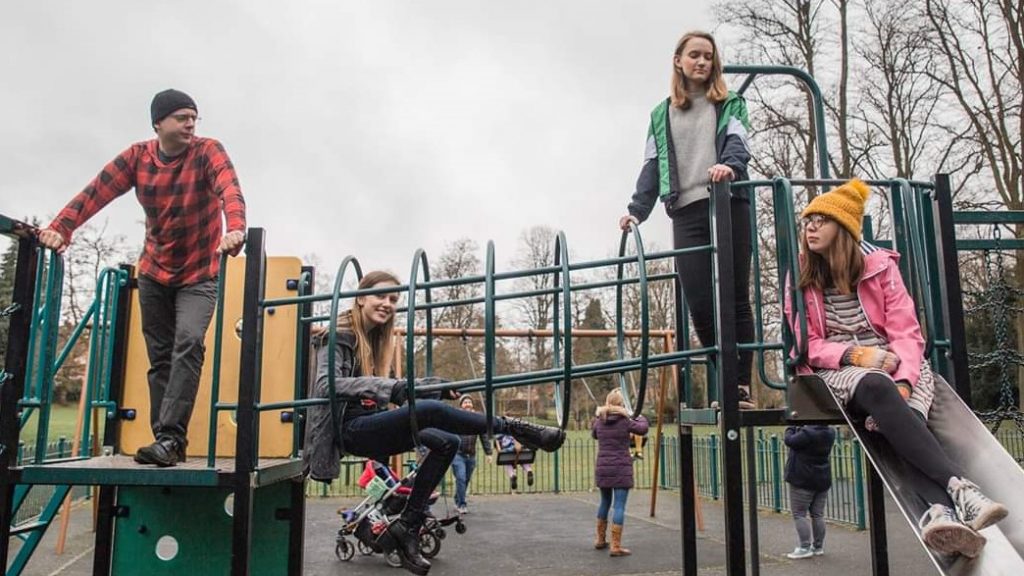
We were blown away by UniSlam last year and so collaborated on a special Verve Prize at UniSlam 2019 for an individual performance, which was won by Prerana Kumar. We also commissioned Second City Poets (who won UniSlam 2018) for a new piece called Playground. See them above bout to drop the hottest album ever.
The point is Verve is about innovating new formats while amplifying important voices and work that is already here. We’re the extended family of indie publishers, editors, poetry nights, producers and even organisers.
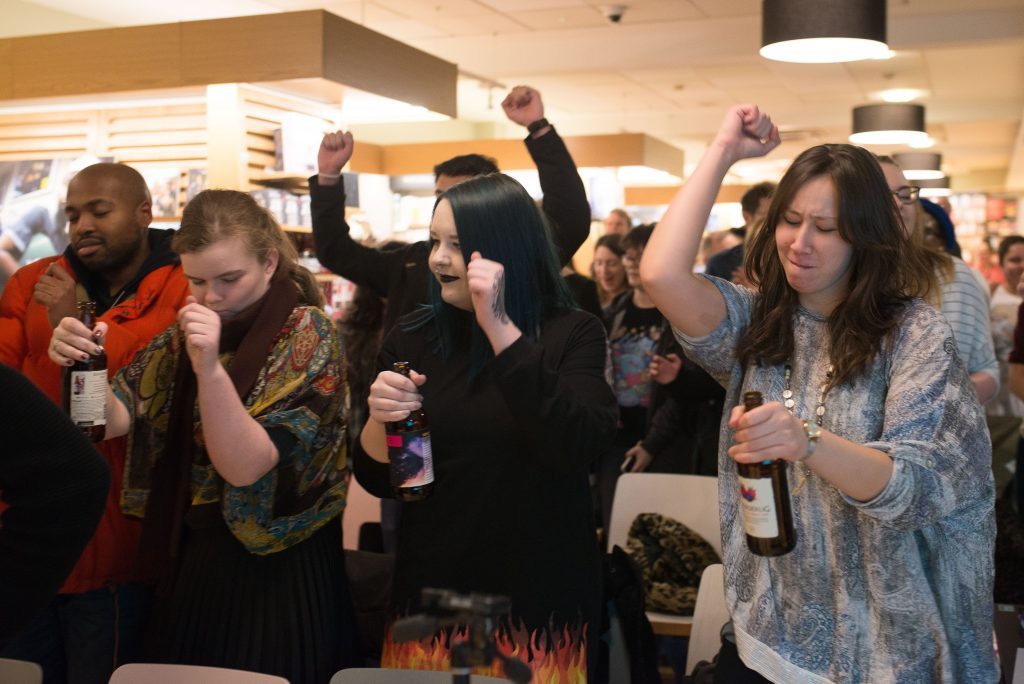
There are some people and organisations to big up who have embraced the festival and our agenda and supported with their time and energy. Swift Foundation, Aki Schilz, Poetry School, Yoniverse, RAP Party, UniSlam, Apples and Snakes Midlands, Bohdan Piasecki, Funkenteleky, Nine Arches Press, The Emma Press, Burning Eye Books, Outspoken Press, Penned in the Margins, Nymphs and Thugs, Poetry Translation Centre. There are many more. They are the real MVPs of poetry. They support us and deserve in turn to be supported by you.
Anyway, in case you are in any doubt, the best way that you can support our work if you value what we do and why we do it is to attend our festival. After all, festivals are only ever as good as the audiences they attract. We promise you the poetry time of your life! I hope you can be there.
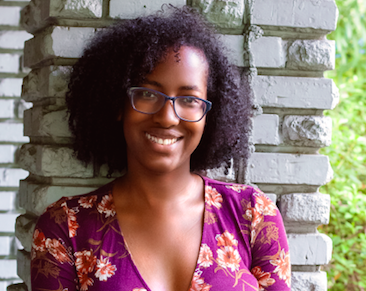
Ariana Brown wrote in her poem “Supremacy,” “in what version of the story do black women win?” I know from my time working on this book and other writings in my life that black women win when we write our own narratives. We win when we pry open the chains of the world and live for ourselves and each other. We win when we love ourselves.
Dreaming up A FLY Girls’ Guide to University was a love song to myself, black women, and other women of colour invested in breaking silences to push back against oppressive systems. I knew that I had spent too much time behind ivory towers to only hear the same story told inside and beyond them. Our stories are not here for diversity campaigns and our photos are not only for recruiting brochures. We are real and nuanced.
My mother is a writer and I have always been encouraged to write as a means of liberation for myself. Through her influence on my life, I have championed the idea of creating yourself to freedom, which is about owning our narratives and using creativity of our inheritance to map a journey toward self-actualization. Words may have been used to enslave me, but I have also used them to free me. And that impact is compounded when my voice joins together with others. It’s been the greatest joy to not write this book alone.
Suhaiymah, Waithera, and Lola, have always been there along the way. To see our stories intersect, diverge, and empower, has only strengthened our work.
This book is much more than just a collection of prose, poetry, and essays about our time at Cambridge. It’s about every institution that is steeped in power and elitism. Every institution that writes strict codes of who can represent it, and who it serves. This book will resonate with anyone who has ever found themselves in the midst of these institutions or wondering what the insides are like. We don’t represent every story, but we do represent our stories. Join us in having these discussions.

A FLY Girl’s Guide To University is out on Thursday 24th January and available for pre-order with free postage right up to the end of January. Order your copy by clicking on the book cover above!
Odelia, Suhaiymah, Lola and Waithera are launching their wonderful book at three (and only three) UK events this month! They will talk about the book, answer questions, read poetry and sign copies at inspiring events in Cambridge, Birmingham and London. Follow the links below to book tickets – you don’t want to miss them!
Cambridge – 26/01/19 – https://bit.ly/2CCEFGp
Birmingham – 30/01/19 – https://bit.ly/2FNgmIU
London – 02/02/19 – https://bit.ly/2AY8jG2
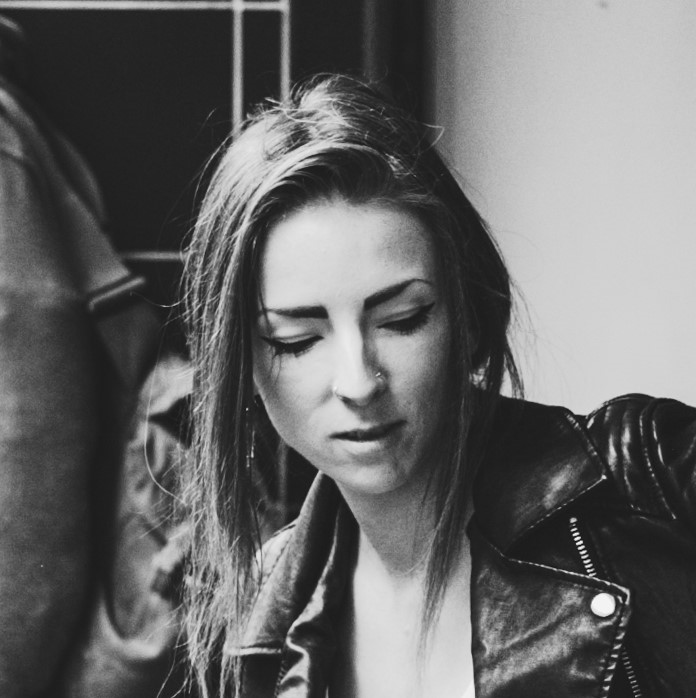
Introducing Evrah Rose: We are thrilled to announce that Evrah has agreed to let us publish her debut poetry collection this coming Autumn. Evrah Rose is making big waves in her native Wales and beyond, speaking passionately into camera on BBC SESH and kicking up a storm with her ferocious and energetic live performances. On the page, she is able to reproduce this energy (and her unblinking determination to depict difficult subjects) wonderfully. We look forward to supporting this powerful poet as she propels herself further into the poetry stratosphere. Keep your eyes peeled for further announcements.
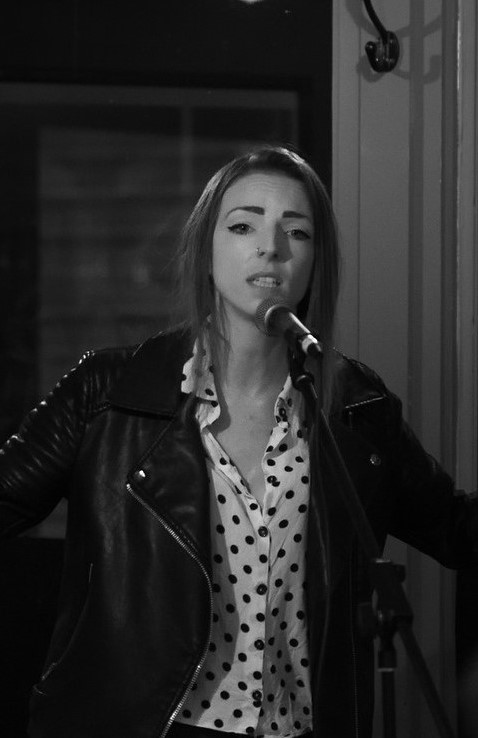
Evrah Rose is an injustice driven poet and spoken word performer. Hailing from Wrexham, North Wales, Evrah delves in to taboo subject matter, unafraid and unapologetically. Using a mix of her own experiences and perspectives of others, Evrah confronts issues such as rape, mental health, addiction and domestic violence to evoke conversation. Evrah began writing poetry when she was just 9 years old to enable herself to rationalise her experiences. As a result, she became socially conscious and passionate about breaking silence.
Just this year Evrah was commissioned by the BBC to write and create spoken word films and has had her work publicised by BBC 2, 3, 4 and BBC Wales. Evrah has headlined various spoken word events around the North West and has also performed at including Apple’s and Snakes DiVerse #7. As a music lover, Evrah combines both music and poetry to create a contrast that both stimulates and inspires and has subsequently been aired by BBC Radio Wales as part of BBC Introducing.
Evrah’s work is a fusion of no nonsense realism, social injustice and hard hitting truths offering her audience a thought provoking experience that leaves them awakened.
Find Evrah:
Facebook: EvrahRose
Twitter: @evrahrose
Instagram: @evrahrosepoetry
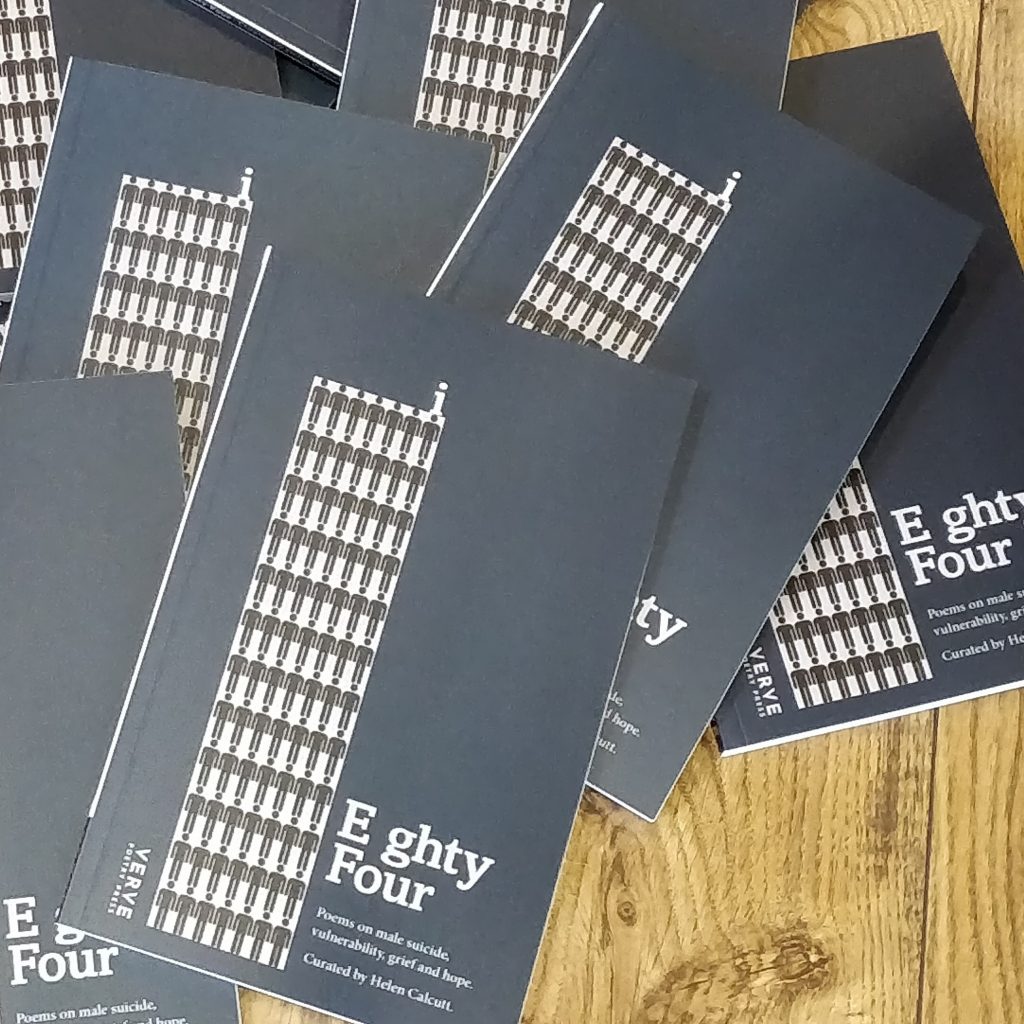
Helen Calcutt’s introduction to the anthology she instigated in aid of a cause so very close to her heart demands to be read. It eloquently and passionately states her reasoning behind and hopes for this unblinking but hopeful collection of poems and some of the background about CALM’s fight to raise awareness around this important issue. As such, we have decided to reprint it here in its entirety. Read, digest, and then please help by buying this incredible book. Help us help CALM. And most importantly of all, help yourself. Verve Poetry.
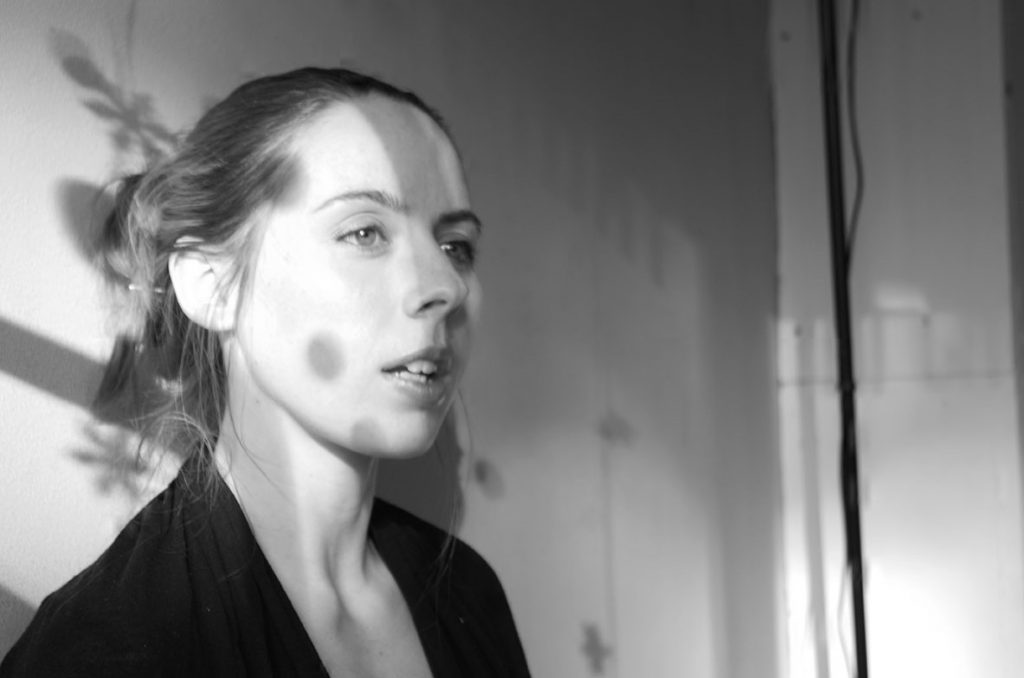
A few weeks after my brother Matthew died, my daughter told me she could see his face in the moon.
Days later, when she spied its silver disc in the window again, she said, that actually, it wasn’t just his face she could see. Everyone who had ever been sad was up there.
The moon changes, and so too, do all the people in its glow.
And that was when I realised ….
We all suffer. There’s this idea that the personal blow of death, or a trauma, can’t be relatable. And with society’s insufferable ignorance to human vulnerability (especially male vulnerability) it’s difficult to see how this could ever change. But I feel it can, if we stop the bullshit. If we accept the reality of the human condition – that it’s a diverse, beautiful, troubled, elated, mish-mash of a being – and if we live by its natural demands, we can influence what is considered ‘normal’ behaviour. What currently stands as such has been working against us for generations, and ultimately, brought us to the mental health crisis we find ourselves in today.
There are other factors to this issue – foremost, lack of funds to mental health services. But change starts with the individual, and this is one of the reasons I created this book. I received little-to-no help from any authority or public service after my brother killed himself. The doctor signed me off for three weeks and I was offered pills. What does this do? This response, though an initial kindness, had no relevance whatsoever to the patterns of my complicated grief, and this signalled a twisted understanding of it, or worse, a normalised ignorance to my vulnerability, in all its ugliness and truth. It also exposed a desire to sweep the problem under the carpet. As was the police’s response after my brother was found. Male dead, domestic tragedy. Tick the box. Move on.
It’s my understanding that, at present, society is shaped to deny us our defining human quality: our complexity. To be human is to be vulnerable. It is also to be aggressive, quiet, commandeering, violent; it depends on the circumstance you find yourself in. But these are all naturally existing, powerful sides to us. For whatever reason, society encourages an over-simplified existence, thus generating accepted ‘norms’ to our behaviour. We live, we die. We weep, we laugh. We suffer, we feel joy. It would seem we’re only ready to acknowledge and celebrate three of these six crucial human emotions.
And the desire to live up to this warped standard of being has sadly become greater than the desire for truth.
Women cry, men do not. Men hit women, women don’t hit men. Both examples of what we would consider a socially accepted norm, denies either party their natural complexity. Women do hit men, and though a violent and harmful act, it also highlights a particular type of vulnerability (perhaps a trauma too) that needs addressing. Men weep. It’s probably one of the deepest, moving sounds I have ever heard. Denying this as a normal attribute to male behaviour, almost refuses them the basic right to grieve, to shed a skin – to let it out. Grief isn’t just about death either. The effects of grief and trauma are very present in the body and mind of someone who has suffered divorce. The loss of a life we love, either from sudden house eviction to an extra-marital affair, can take 12 months at the very least, to overcome. We can even grieve, deeply and with absolutely profundity, the loss of our former selves in the wake of any personal travesty.
Not acknowledging the many possibilities, the many realities, to inner turmoil, is damaging. It represses and confuses us. Suicide rates are through the roof in the U.K. Male suicide stats are particularly devastating. 84 men kill themselves a week, my brother being one of them. The reasons why he did it, are complicated. And unknowable to us in many ways. But I will say, that the pressures of a society largely unwilling to accept the anxiety and despair of a ‘man’s man’ (holding down a job, a mortgage, child-care) will have had something to do with it.
The more we work to a fixed behavioural and emotional ‘standard’, the more we squash the natural intricacies of the broader human condition—not honouring or respecting who, and what we are. It’s time we changed that. After putting out the call for submissions and contributions to this anthology, I can see I’m not alone in my thinking.
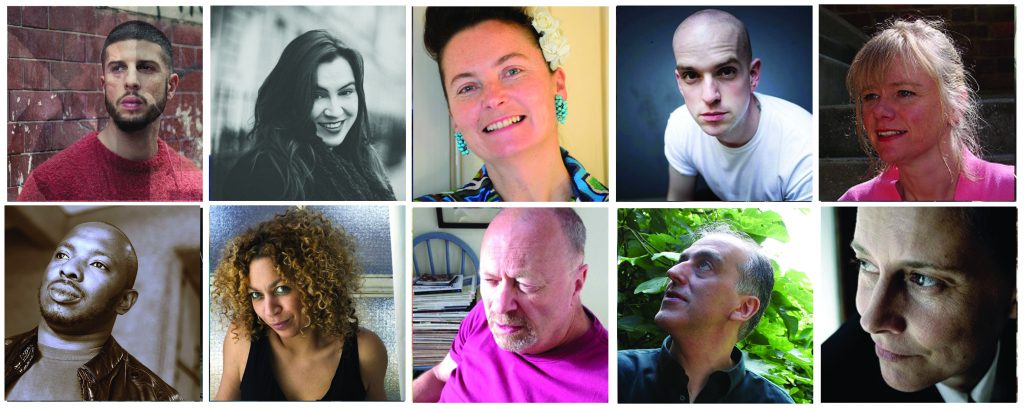
The many poems I received, felt ready-made. Like they had been waiting at the bottom of a draw for the perfect opportunity and place to speak. I’m glad those who submitted felt this was it. The poems published here, and the adjoining blog, have given this book the truth it was seeking, showcasing humanity in all its vulnerable beauty. From the baby in the bath who knows that daddy is gone, to the woman whose father haunts her like a wolf through the window, anthology Eighty-Four gathers an exquisite collection of voices, singing completely different hymns, but together creating a sincere and authentic piece of music. From well-known poets, to new voices, there’s a glittering strength of character to this volume, because of the honesty from which its poems have been created, courageously and delicately embracing human complexity in all its forms.
I knew immediately the title would be ‘Eighty-Four’. Inspired by the success of the #MeToo anthology, I wanted to create something for a specific cause, that honoured and supported Project 84, by the charity CALM (campaign against living miserably) and drew attention to an issue in the only way I knew how: through poetry. But, for me, this number represents more than a devastating statistic. 84 men lost to suicide a week isn’t a simple black and white problem. And the problem itself, isn’t a symptom of any single cause. It’s part of a wider dilemma, acutely connected to our almost pathological denial of human fragility (connected perhaps, to our fear of immortality and death). If you’re reading this, you may not feel an immediate emotional connection to male suicide. But you can understand the prevalence and seriousness this number holds. You might also start to understand what it means for us as a society, and share in asking the crucial question: how shamefully oppressive have we allowed the world in which we live, to become?
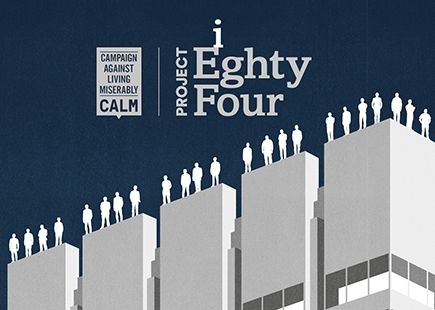
Together, with the creative minds at Verve Poetry Pres, CALM, and my wonderful father and co-editor, we have created a book that, in opening its doors to the devastating theme of male suicide, has inspired a river of additional sub-themes and contexts: all relevant and connected to the central theme. At one stage, I considered grouping the poems under different chapters. But with time, I saw this wasn’t necessary. Anthology Eighty-Four has taken on its own life and shape, with each new phase of reading, though distinct, somehow aligned and in harmony with the one before it. There are poems here that sing to each other. Words and images that relate, yet with their altered backdrops, offering new perspectives. There are clear changes in voice and tone: the angry man, to the angry bereaved. This kind of opposition (or ‘balance’ as I like to call it) gives this anthology the emotional range it deserves, and is an authentic reflection of the overwhelmingly diverse, and sustained affects of suicide. Each poem conducts its own careful truth, told with searing conviction. Light and shade.
This book is for every single person who has ever felt silenced. For anyone who feels uncomfortable talking about trauma or grief, to those currently suffering from grief-by-suicide, or who want to learn more about mental health issues. Let this be your touch-stone. Not only does it prove how powerful poetry can be in bringing our injured worlds into view, it also exposes a new, hopeful reality. Saying to you – start talking and keep going. Live through and voice your vulnerability. Speak and live your humanity.
This book is also for Matthew. The older brother who was always giving. The first one to call me and tell me everything was going to be okay when I was pregnant. Whose laughter filled the room and infected every single person in it. Who was honest about not liking poetry. Who listened, and reserved judgement. Who was open and giving to every other human flaw, right to the end. Just look how this generosity has inspired others and lived on.
Helen Calcutt (December 2018).
Full list of poets included (A-Z): Anthony Anaxagorou, Romalyn Ante, Casey Bailey, Abie Budgen, Lewis Buxton, David Calcutt, Helen Calcutt, Louisa Campbell, Diana Cant, Garry Carr, Stewart Carswell, Gram Joel Davies, Michelle Diaz, Glyn Edwards, Carrie Etter, RM Francis, Alan Girling, Salena Godden, Emily Harrison, John Hawkhead, Martin Hayes, Alastair Hesp, Shaun Hill, Paul Howarth, Rosie Jackson, Janet Jenkins, Helen Kay, Asim Khan, Charles Lauder Jr, Hannah Linden, Jane Lovell, Nick Makoha, Liam McCormick, Andrew McMillan, Abegail Morley, Katrina Naomi, Antony Owen, Isabel Palmer, Ian Patterson, Mario Petrucci, Zoe Piponedes, clare e.potter, Peter Raynard, Brenda Read-Brown, Victoria Richards, Belinda Rimmer, Bethany Rivers, Stephen Seabridge, Richard Skinner, Caroline Smith, Janet Smith, Joelle Taylor, MT Taylor, Christina Thatcher.

Well, that went by quickly. Verve Poetry Press has completed it’s first full year as an indie poetry publisher for Birmingham. And what a year it’s been! We have published so many wonderful poets this year. Here’s the list: Matt Abbott, Casey Bailey, Jenna Clake, Nafeesa Hamid, Rupinder Kaur, Luke Kennard, Polarbear, Leon Priestnall, Amerah Saleh, and Hannah Swinger, as well as anthologies with Beatfreeks Poetry Jam, Verve Poetry Festival City Poems and Lunar Poetry Podcasts. You an read all about these wonderful poets and books via https:vervepoetrypress.com/shop
Our year end bash at Glee Club Birmingham was an absolute blast, featuring performances from all our poets and wonderfully hosted by poet with the mostest Leon Priestnall. The pics above are from this event. It was wonderful seeing our whole year of publishing alive on the stage and the sense of family this created. And we had a wonderful turnout too, which made us feel that people were glad to have us (which is a lovely feeling indeed).
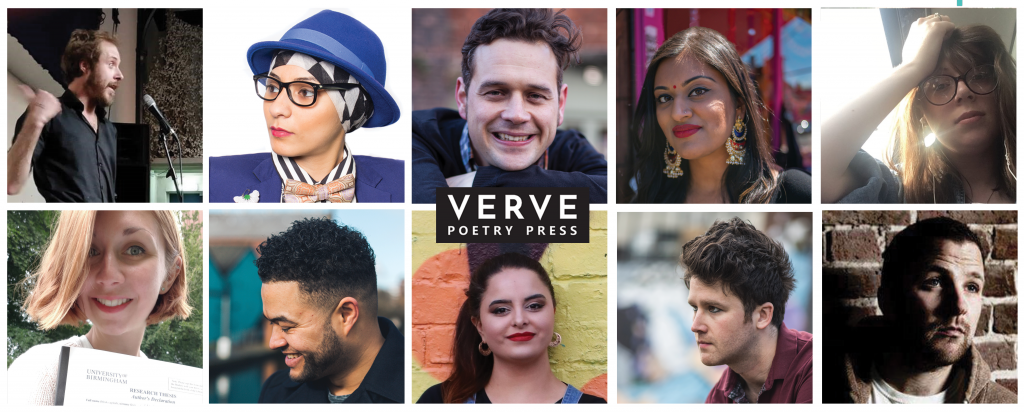
The next six months ahead looks equally exciting for us, with books planned with incredible local poets Jasmine Gardosi, Kamil Mahmood, Yasmina Silva and Scarlett Ward – pamphlets due from the incredible Katrina Naomi, Ben Norris and Clare Trevien and two important books coming first thing in January – Eighty Four: Poems on Male Suicide, Vulnerability, Grief and Hope, edited by Helen Calcutt and in aid of CALM – and A FLY Girl’s Guide to University by Lola Olufemi, Odelia Younge, Waithera Sebatindira and Suhaiymah Manzoor-Khan. Believe me, you don’t want to miss either of these books. And with more wonderful books to announce for the Autumn soon, you can see we are in for another exciting year!
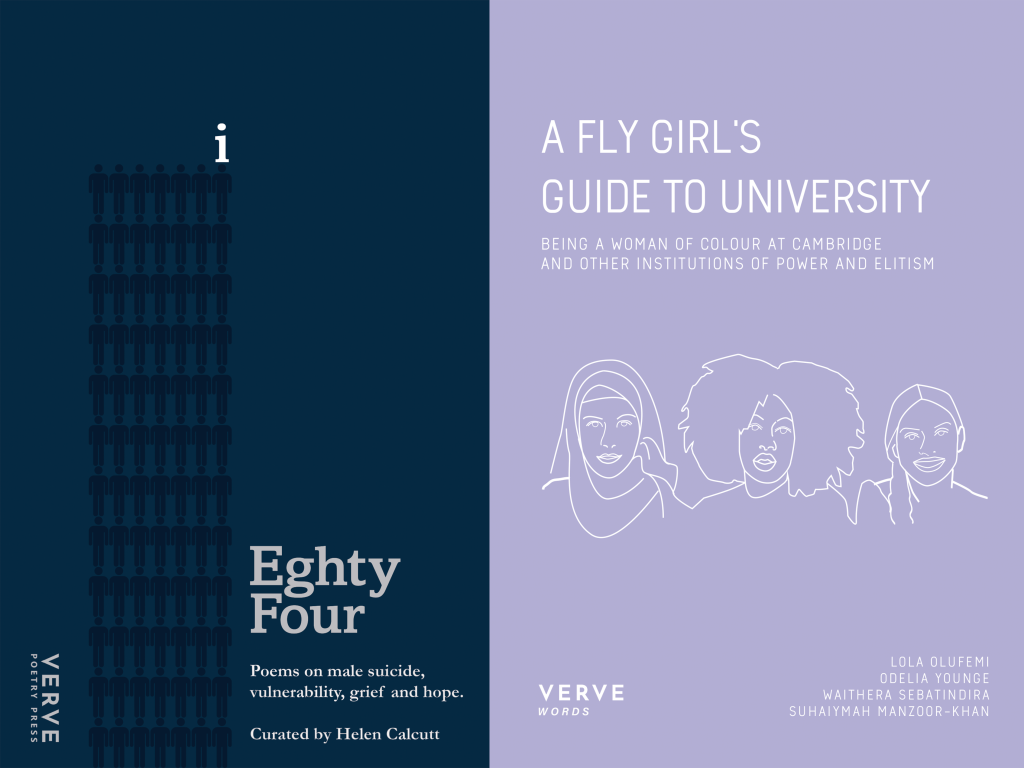
I hope you are all as excited as we are! We have been so well received as a brand new indie poetry press and would like to take this opportuniy to thankyou, our readers, our audiences, for all the support you have shown us in these last twelve months. We don’t deserve you but we strive to earn your continued support.
We’d also like the thank the bookshops who have taken the trouble and leap of faith required to stock some of our books when there are so many books available to stock – you are many and we are so thankful for every order, but we’d like to mention in particular, Waterstones Birmingham (essentially our home store), Blackwells Oxford, Pages of Hackney and Five Leaves Nottingham, for support beyond anything we could have expected in terms of both stocking of books and putting on events – thankyou!
The poets and I are so, so very grateful to all of you! Look out for more news from us in the new year and have a wonderful and peaceful Christmas Season. With all our best wishes. VPP! 🙂
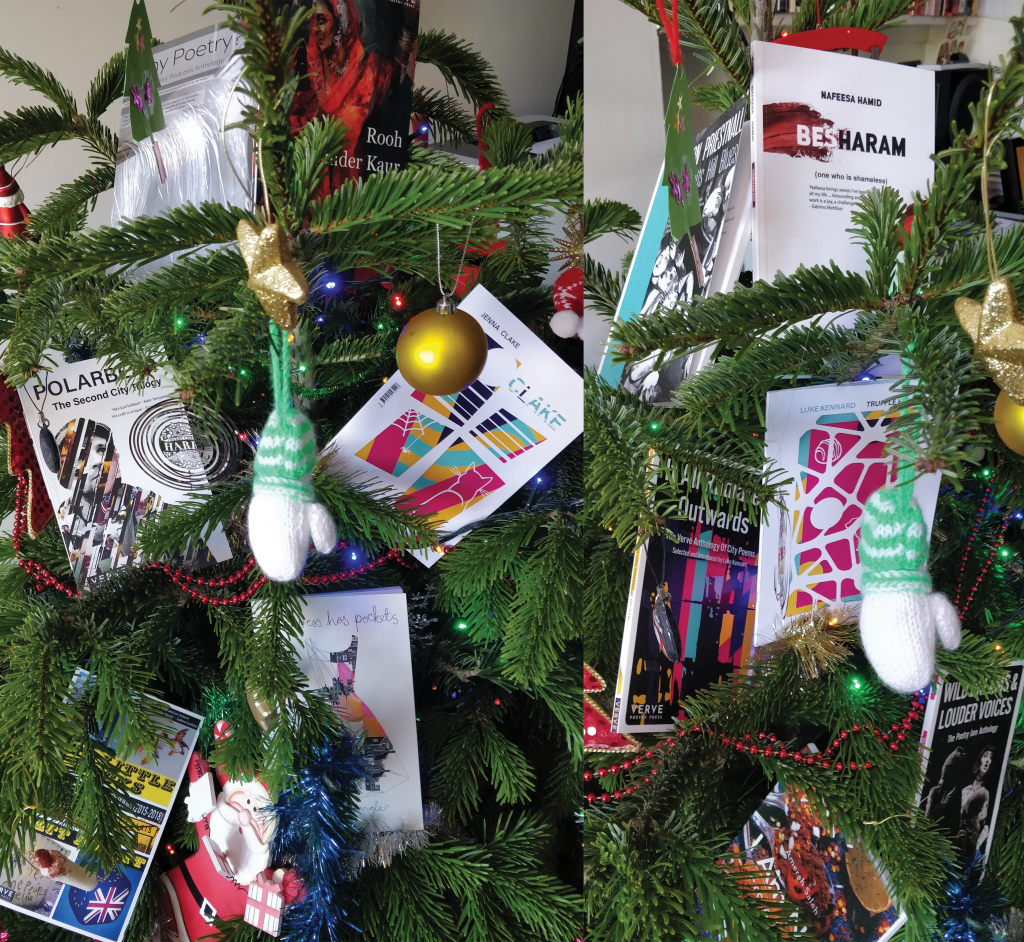

Three years ago during my final year studying History at Cambridge, me and three of the most wonderful, fiery, radical & brave women I know – Lola Olufemi, Waithera Sebatindira and Odelia Younge – decided to write a book documenting our experiences as women of colour in an institution that so violently erased our realities, histories and sometimes our very existences; in fact an institution which ideologically and financially was rooted in and flourished on the concept and consequences of slavery, racism and colonialism.
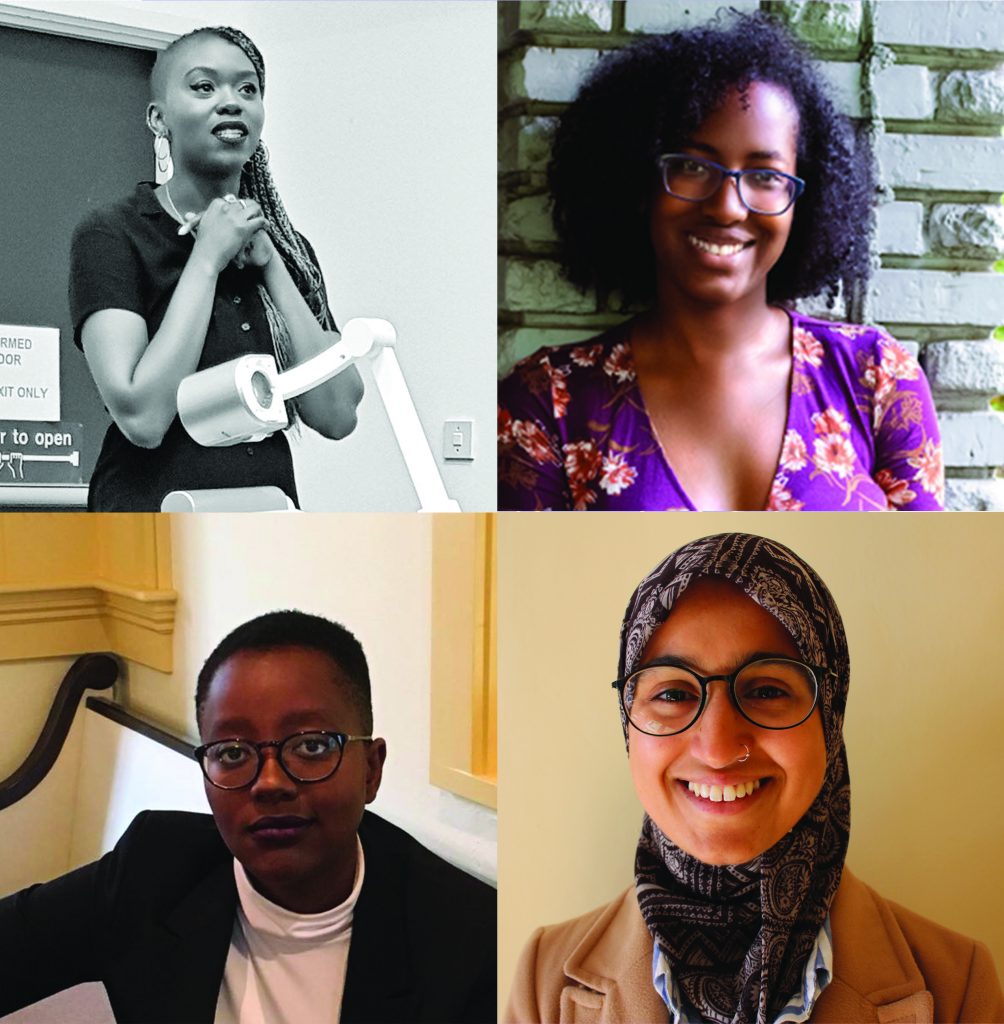
We all 4 initially met at “FLY” – a group founded before we arrived, specifically as a space for women and non-binary people of colour. In that space was the first time I found the truth of my experiences at Cambridge validated and recognised, and I found I didn’t have to be weighted down by the experience of white supremacist patriarchy but that I could funnel my feelings into anger and creativity! It sparked my engagement with radical politics, poetry and decolonial feminism ever since.
The book, of course, was not something anyone wanted to publish. One publisher actually told us it would have been better if it were fiction – a reminder that it is easier to empathise with women of colour when we aren’t real.
However, alhamdulillah, this year @vervepoetrypres listened to our vision, heard us and recognised that this book needs to exist. IMHO we don’t particularly need a best seller or big recognition.
. I am excited solely because this book is a testament to the experiences that never get heard and thus are never accepted as real. But we are real. Our experiences are real and this book is a testament to us and every woman of colour struggling to articulate how it feels to be in spaces built for others.
We publish in January inshaAllah (and you’re all invited to the launches! Dates tbc!) but you can pre-order RIGHT NOW by clicking on the book cover illustration on this page.
Above all I hope our FLY GIRL’S GUIDE can be a testament, a refuge and a friend to anyone who needs it. I am so thankful for all the WOC in my life and ultimately, always, to Allah.
Suhaiymah Manzoor-Khan @thebrownhijabi
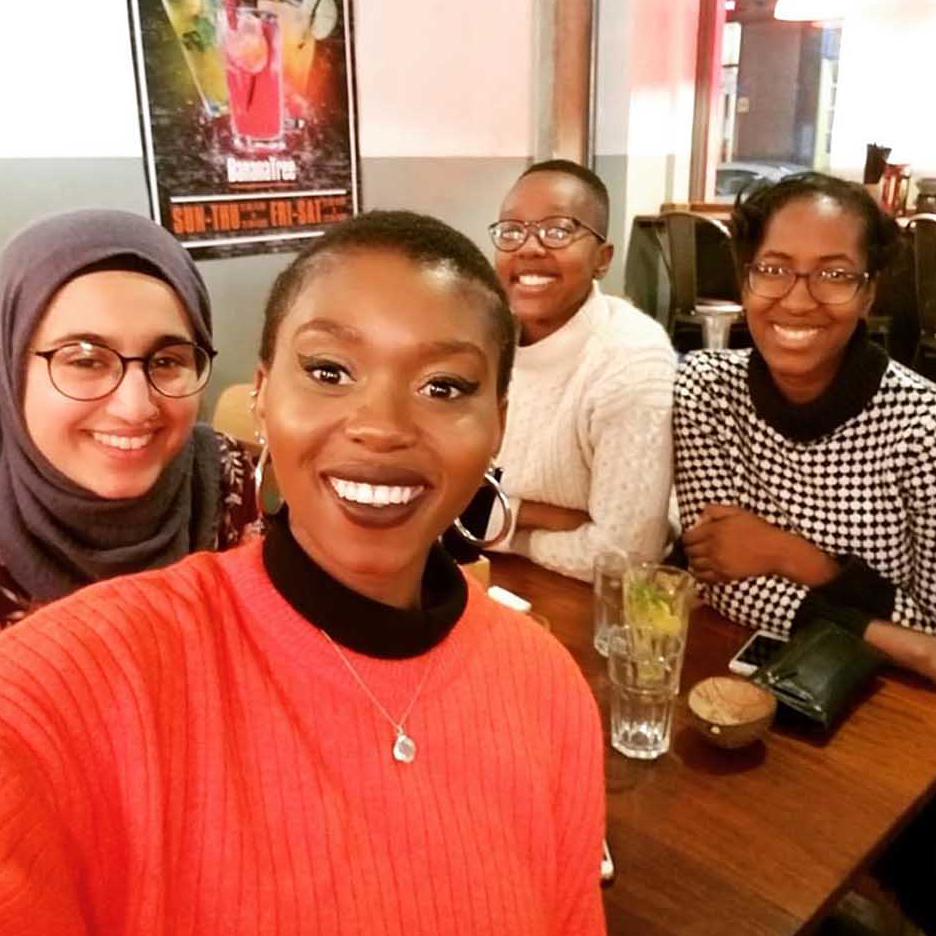
A FLY Girl’s Guide to University is a collection of memoirs, essays, poetry and prose from four women of colour who studied at the University of Cambridge. It is a multifaceted calling out of the wrongness underpinning their shared experience at Cambridge, and the experiences of others in similar institutions throughout the UK. But they describe it best: ‘The purpose of our book is simple: we believe that our lives, our experiences, and our voices matter, especially in a place of power, pervasive whiteness and exclusivity. Our voices not only deserve to be heard but must be because the ‘Cambridge experience’
of a middle-class, white, cisgendered, able-bodied man is not the only one. Ours cannot be silenced.
We came together through FLY, a network specifically by and for women and non-binary people of colour at Cambridge. As members of FLY, we were all vocal and active in feminist and anti-racist politics, as well as adamant about intersectionality – whether in education, research, creating spaces on campus or in our campaigning. Through meeting there, hearing one another and experiencing our absences elsewhere, we decided to write this book. Writing gave us a language and space that we were not often afforded and a chance to live beyond the niches carved out for us by others. This book exists as a testament to our existences in a place we were often made invisible, and stands as a demonstration of the fact that we have the power to validate ourselves.
We believe our book itself to be a form of activism in its fearless sharing of our experiences and in contributing to the provision of previously silenced truths. In some ways, the importance of what we say is almost as important as the fact we say it at all because the power of this book is borne from the desire to continue a legacy of recording lived experiences of those whose stories often go unpublished. We want our work to act as a disruption, a hope, and a symbol that though marginalised in many ways and many spaces, we are very much alive, evolving and powerful.’
This wonderful book needs to be read, discussed and understood, in Universities, but also in government offices, businesses and anywhere that people are made to feel excluded, estranged and exposed because of their heritage, their religion or their appearance.
This item is also available as an EPUB download. To order this, please go HERE
Suhaiymah Manzoor-Khan
Suhaiymah Manzoor-Khan is a writer, spoken-word poet, and educator invested in unlearning the modalities of knowledge she has internalised, disrupting power relations, and asking questions around narratives to do with race, gender, Islamophobia, state violence and decoloniality. She did her BA in History at Queens’ College, Cambridge, and MA in Postcolonial Studies at SOAS. Alongside a wider education from the epistemology of Islam and work of women of colour and anti-systemic thinkers from across the world, Suhaiymah regularly speaks and workshops on racism, Islamophobia, feminism and poetry across the UK as well as writing about those topics at her website, www.thebrownhijabi.com. Her work has been featured in The Independent, The Guardian, Al-Jazeera, BBC, The Islam Channel, ITV, Sky TV, TEDx conferences, music festivals, US slams and British Universities. She is trying her best to destabilise accepted narratives and disrupt the tendency to fall into binary explanations, insha’Allah.
Waithera Sebatindira
Waithera Sebatindira is a Law graduate from Trinity Hall and recently completed her MPhil in Multi-disciplinary Gender Studies at the same College. While facilitator of FLY, and with the indispensable support of its founders and a group of committed women of colour, she expanded the group’s membership and reach. During this time, Waithera developed a black feminist ethic that continues to be informed by the work of inspirational women she reads and meets – especially this book’s co-authors. She went on to become the first woman of colour to hold the position of full-time Women’s Officer on the Cambridge University Students’ Union and, during her tenure, campaigned on behalf of woman and non-binary students on campus while coordinating decolonial efforts across campus.
Lola Olufemi
Lola Olufemi is a black feminist and organiser from London. She graduated from Cambridge with a degree in English Literature in 2016. She facilitated FLY, the group for women and non-binary people of colour at Cambridge from 2015-16 and held roles on the BME and Women’s Campaign. She was the Cambridge University Students Union Women’s Officer from 2017-18. During her time at university she was heavily involved in student activism, working on, amongst others: the establishment of support for survivors of sexual violence, decolonising the curriculum and opposing the marketisation of higher education. She is currently the NUS Second Place on the NUS Women’s Campaign & sits on the National Executive Council. She is a masters student in Gender Studies who is interested in black feminist thought as a vehicle for thinking about the self and others and disrupting systems of power. She is currently writing a book on reclaiming feminism for young people which will be published by Pluto Press in 2020.
Odelia Younge
Odelia Younge is an educator and writer based in Oakland, California. In her life and work, she centers discussions about blackness and resistance. Odelia earned a B.A. in history and literature from Harvard and an MPhil in politics, development and democratic education from Cambridge. Her research has focused on black women collectives, historical memory, transgressions and resistance, and black male youth identity within spatial theory, critical youth studies, and radical black feminist theory. Odelia also has a background in peace education and children’s rights, developing programs in places such as Miami, Florida and the Greater Accra region of Ghana. She has led work across the United States on transforming education, decolonising systems, and building out spaces for black writers, while also organizing spaces for creative expression. Odelia is driven by her faith, radical black love, and the concept of creating yourself to freedom — forgetting what your oppressors have told you is the truth, and building anew. Odelia is the co-founder of Novalia Collective, which focuses on storytelling, community building, and cultivating spaces that vanquish fear of uncertainty and the unknown. She takes immense pride in being the editor and compiler of A FLY Girl’s Guide to University.

I fell into spoken word before I really knew what it was. Speaking stories and playing with rhyme was something we’d always done, without any designs on stages or gigs.
Once I was introduced to this thing, these events, where people stood up and spoke their words to an audience, I ran mouth first, straight into it. The freedom and openness of it grabbed me. The fact that I could play with spaces and silence as well as the patterns of speech, descriptions, repetitions, all felt like this magical mix of music and chemistry.
Once I started finding my voice, I felt the itch to play. That meant longer pieces. That meant more risks. More layers. Things I wanted to learn.
I was lucky enough to get support to develop my first feature length piece from Birmingham REP. If I Cover My Nose You Can’t See Me. In that one I played with rhyming and not rhyming. Narrative devices. The dance of rhythm and the definition of character voices. All combined with a Batman infused slightly surrealist noir story about a boy following his future self. It felt great.
On the back of that I wanted to push further. My spoken word pieces all felt like short films to me as I spoke them, so I asked myself. Challenged myself. Could you speak a full film?
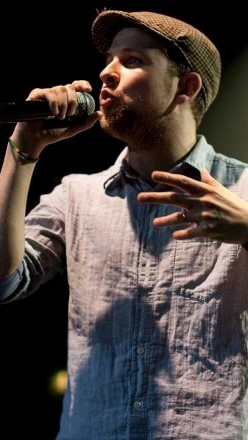
RETURN is just that. A combination of shot descriptions and dialogue. An experiment in conviction and simplicity. My hardest performance piece to speak (and arguably to listen to), but a massive benchmark for me personally in terms of what I could do with words and my mouth.
After that I played with lots of ideas for a while until I came up with the final piece to what had become, in my mind, a definite trilogy. If I Cover My Nose was all about leaving Birmingham. Breaking the cycle of my life at the time which had gotten stale and uninspiring. RETURN was all about the desire to come home and realising how much I love Birmingham and it’s influence over my new creative life.
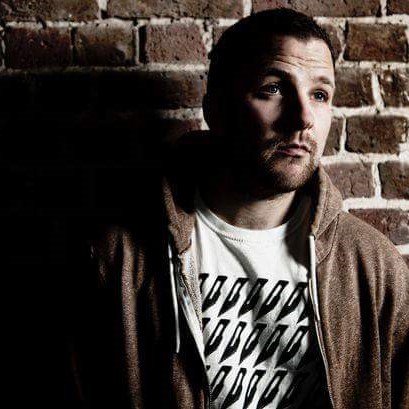
The final piece of the puzzle became a celebration of the mess between what I was and what I’d become. The origins of my new life and the fractured sense I’d come to make of it. A melting pot of form, voice, memory, fantasy and realism. OLD ME was born and the perfect third instalment to my spoken brummie saga.
I am so proud of these pieces and how they map my journey as a spoken word artist trying to craft his own voice whilst also trying to gather a sense of who the hell I am.
They have helped me find myself. And my heart.
And they, just like me, belong to Birmingham.
Speaking to Stuart about Verve and the work they are doing with the festival, events and printing collections, I got stupidly excited about being part of their list. I’d spoken to other people about releasing stuff before and always felt like it wasn’t the right thing for these words. Verve is the right thing. A Birmingham press, offering me the chance to share my Birmingham trilogy with the world in print? Yes please. I said. Thank you I said. Chuffed.
I cannot wait for this book to come out and let people read, speak and
play with the stories that have shaped my life. The Second City Trilogy is my creative time capsule.
Nice one Stuart. Nice one Verve.

Polarbear AKA Steven Camden is a writer from Birmingham who moved to London for a girl.
His debut young adult novel ‘TAPE’ was published worldwide in January 2014 by HarperCollins to rave reviews and his second novel, ‘IT’S ABOUT LOVE’, published in June 2015, was Book of the Month for The Guardian. His third novel ‘NOBODY REAL’ was recently published in May 2018.
His collection of spoken word stories ‘EVERYTHING ALL AT ONCE’ was published by Macmillan in July 2018.
Under his performance name Polarbear, he is one of the most respected spoken word artists in the UK and has performed his work from California to Kuala Lumpur, via

Glastonbury, Latitude, Camden Crawl and pretty much every festival going.
He came to prominence as part of Apples & Snakes Exposed tour 2007 and has since written and performed three feature length theatre pieces; If I Cover My Nose You Can’t See Me (Birmingham REP), RETURN (BAC and mac) and Old Me (Roundhouse) on national and international tours.
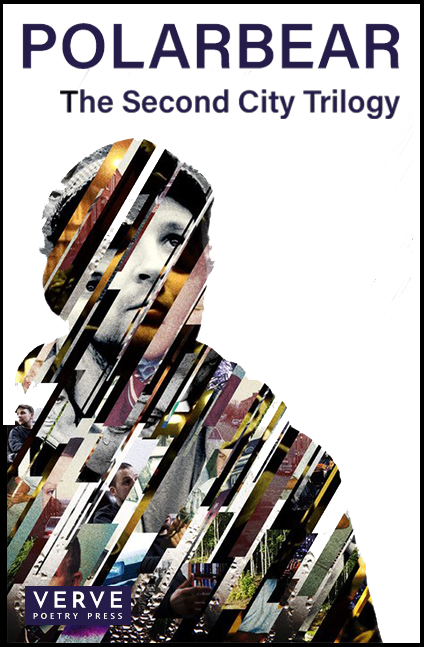
These three long pieces from Birmingham born Polarbear AKA Steven Camden are his first printed pieces for adults. We are over the moon that he has chosen Verve Poetry Press to release them for him.
The three long pieces, poetry meets performance, are what he describes as his ‘spoken brummie saga’ – and are what we describe as his ‘portrait of the artist as a young poet.’ Steven again: ‘I am proud of these pieces and how they map my journey of a spoken word artist trying to craft his own voice while at the same time trying to gather a sense of who the hell I am.’

The language of these pieces is typical Polarbear – rhythmical, arrestingly simple, every word laden with a great weight of meaning until a spell is cast over the reader or listener and magic begins to happen. The sometimes humdrum setting of brothers’ rooms or sofas in flats and houses in Birmingham suburbs, of Co-ops and buses and passenger seats, sparkles in these pieces. The tight lipped conversations are all this poet needs to communicate a world of feeling, loyalty and deep seated affection.
These pieces absolutely need to be read, and if they can be, listened to too. They are the journey that delivered the man, the evolution of the spirit of the bear.
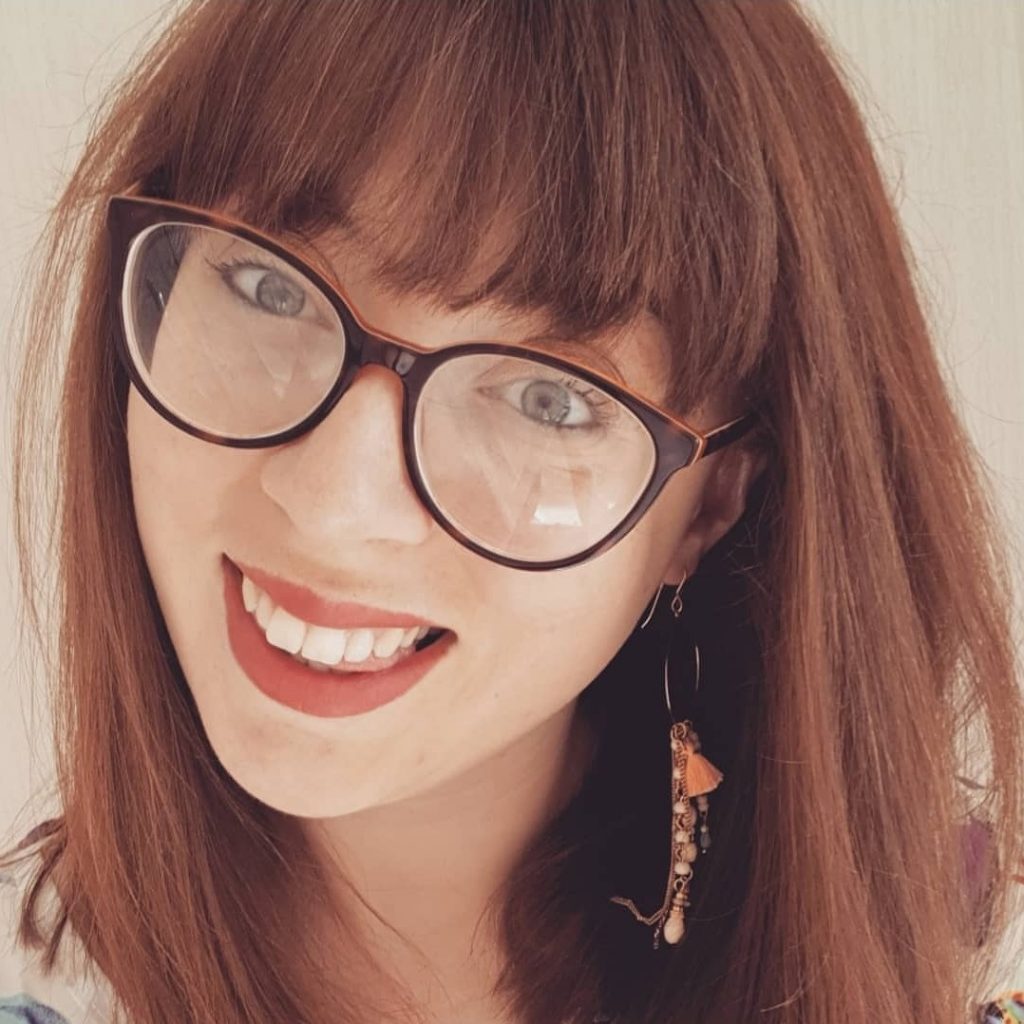
Hannah Swingler is a poet, teacher and artist, born and bred in Birmingham. She calls a forward roll a ‘gambole’.
She was the winner of CoachesSLAM 2018, as well as coaching the University of Birmingham’s uniSLAM team to victory. She went on to represent the UK at CUPSI in Philadelphia.
Hannah’s ‘haunting yet hopeful’ storytelling spans themes such as female identity, relationships and mental health. Luke Kennard observed, “her work finds the beautiful and the lyrical in the everyday with the wisest, self-deprecating heart and intuitive wit and humanity.”
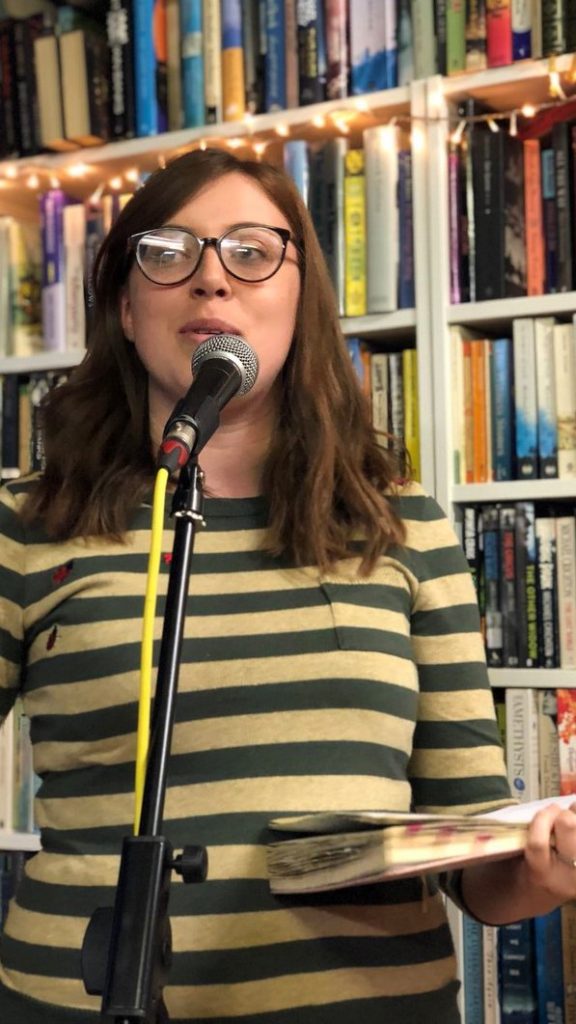
Did you know? – as of 18/3/19 Hannah is the new face of Nationwide. Her wonderful poem, High Street Romance, can be seen on prime time ITV!!! You can see it below…
She has performed across the country: with Tongue Fu, featuring at Howl, Grizzly Pear, Verve Poetry Festival, Cafe Grande Slam, Stirchley Speaks, and at REP Birmingham, BOM, the Old REP, Ikon Gallery, Upstairs at the Western, Derby Theatre, Oxjam Fest, Birmingham Weekender and mac, amongst others. She featured on BBC radio discussing the importance of poetry for young people.
Hannah is an alumnus of both the National Youth Theatre of Great Britain and Beatfreeks YSC.
She believes good things come to those who make.
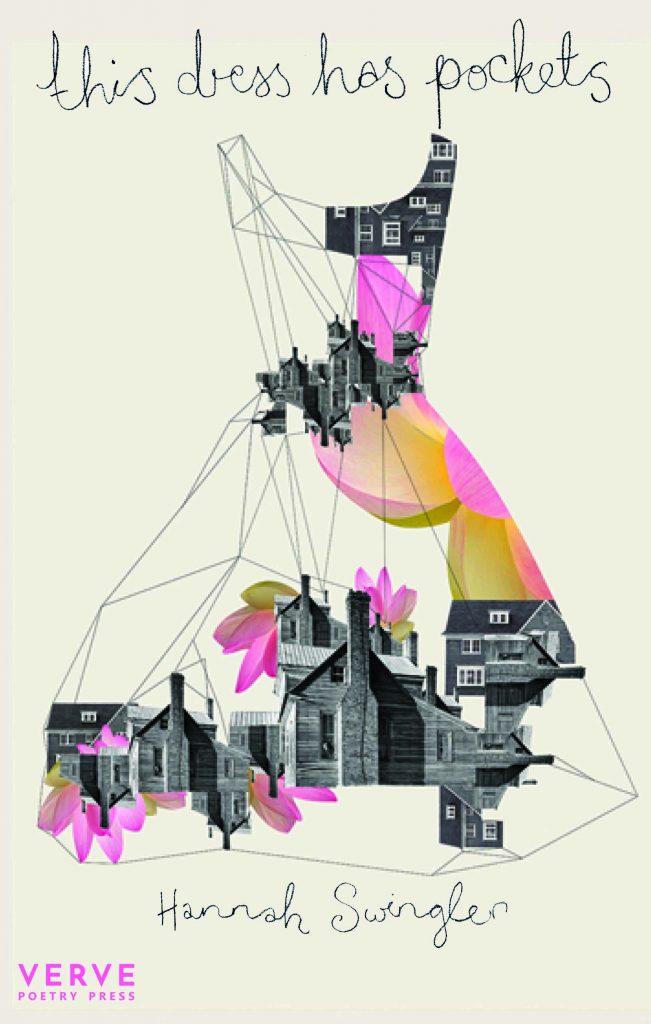
Hannah describes her incredible debut collections of fresh and original poetry best.
‘I struggle to throw things away. Used envelopes, mostly. This is not only my debut collection of poetry, it is my hoard, my memory bank, my adventure into the known.’
This dress has pockets exudes the feeling of finding a dress that fits in a charity shop for only £4.50 and it has the functionality of pockets that are deep enough to carry unsent love letters and conkers and those memories that you wish you could binge watch, or tape over.
It is ethereal but memorable, surreal, but familiar, like a dream you weren’t able to keep hold of. It is what it means to remember, what it means to grow up storing your thoughts close to you, in pockets of dresses that make you look alright until you sit down in them. Now is your time to dance in it, now is the time to empty your pockets and spin.
We are thrilled to be bringing you this poetry dress with its many marvellous pockets. We encourage you to peer deep into them and be amazed!
This item is also available as an EPUB download. To order this, please go HERE
Sample Video: High Street Romance
Sample Poem: Freddie Mercury
When I am nine, my parents move us to the countryside, away from bus routes and gang wars. The house they buy is bigger, too cheap for what is offers and their deliberation doesn’t last long. They don’t think to look at the old wiring; block out the sound of the motorway at the bottom of the garden.
Financial recklessness is hereditary.
We continue to go to school in the city, work in the city: be city dwellers that must sleep where we can see the stars clearer. Thirteen miles there, another thirteen back: the car becomes our living room, our bedroom, our home.
It doesn’t have a CD player, so my brother makes jukebox cassettes, one song per family member then repeat. I choose Jesus of Surburbia by Green Day because it is nine minutes and seven seconds long and I crave the attention.
Fields, trees, abandoned farm buildings, hair pin bends, blind junctions, I know the landscape better than the opening to my favourite movie.
I write birthday cards leaning on headrests without curving a line.
I can apply a full face of makeup using the rear view mirror from the backseat.
I learn to change outfits without flashing the driver.
I devour books like they will be burnt at the end of the day.
My brother falls in love with a girl who lives opposite our school. He stays overnight on a camp bed in her living room, I think. He stops making mix tapes.
I am given an ipod for my birthday and spend the mornings staring out of the window pretending I am in a music video.
My mother only drives when my Dad is already home. At night, she turns the lights off on roads without cat eyes and we scream in the seconds of darkness, before we flash back to visibility. One night, we drive passed a man in drag walking in the road towards us. Two weeks later, the local headlines talk of a “decapitated tranny” who got hit by a car on her way home from a dinner party.
My Mom stops turning the lights off after that.
Mornings mean minus six degrees and the heater breaks.
I fall in love with a boy who lives opposite my school in an adjacent road to my brother’s girlfriend. I can see my art room from my bedroom window. I stay overnight on a camp bed, sometimes.
I’m not sure whether the reason I love him is because I get an extra half an hour of sleep in the morning.
We resurrect Freddie Mercury on a thunder filled October night through dramatic, unrehearsed yet surprisingly harmonised word-perfect rendition of Bohemian Rhapsody. We congratulate each other on hitting the high notes, swerve to miss a pheasant and hit a tree instead.
When I graduate – after thirteen years of thirteen miles there and thirteen back – my parents move to the road my brother’s now fiancée lives on. I can see my old room from my bedroom window. I get an extra half an hour of sleep in the morning.
There are bus routes and gang wars and no blind junctions.
We do not make mix tapes.
We do not resurrect Freddie Mercury anymore, but I can still apply liquid eyeliner travelling over potholes using the rear view mirror from the backseat.
CONTACT HANNAH:
Twitter: @HannahSwings
www.facebook.com/hannswings
https://hannahswings.com
Proud to be sister press to Verve Poetry Festival. See what they’re up to here!
By continuing to use the site, you agree to the use of cookies. more information
The cookie settings on this website are set to "allow cookies" to give you the best browsing experience possible. If you continue to use this website without changing your cookie settings or you click "Accept" below then you are consenting to this.
